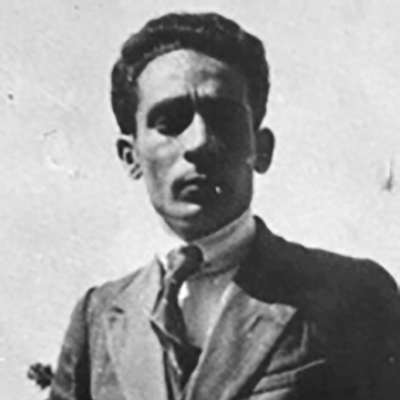Joan Salvat-Papasseit
(Nou diccionari 62 de la literatura catalana)
Barcelona, 1894-1924. Poet
Self-taught and of working class origins, he is one of the most significant representatives of the historic avant-garde in Catalonia. His father died when he was a child and in 1901 he went to live in the Asilo Naval Español children's home. From 1906 to 1917 he had a number of different jobs, from grocer's apprentice to night watchman on the docks. Around 1914 he joined "Juventud Socialista" (Socialist Youth) for which he began to write in revolutionary publications such as Los Miserables, La Justicia Social of Reus and Sabadell Federal, after 1915. His inspiration came from anarchism and he was a staunch defender of the working class, usually using the pseudonym of Gorkiano. Many of these articles were collected in Glosas de un socialista (A Socialist's Notes - 1916). At this time he preferred to write in Spanish, pouring out his social and political criticism in this language. His essays have been gathered into three collections: Humo de fábrica (Factory Smoke - 1918) with a prologue by the writer Àngel Samblancat, this book including many articles from his Glosas (Notes); the texts of Mots propis (My Own Words), moral reflections on humankind inspired in the philosophy of Nietzsche and the ideas of Torres-Garcia that were published (1917 - 1919) in the review Un Enemic del Poble; and, finally, La ploma d'Aristarc (The Pen of Aristarch), which remained unpublished.
He married Carmen Eleuterio in 1918 and the couple had two daughters, Salomé and Núria, for whom he wrote Els nens de la meva escala: dites d'infants (The Kids Where I Live: Children's Sayings - 1926). After 1919 he was in charge of the books department in Galeries Laietanes, working as a protégé of Santiago Segura. Salvat-Papasseit, helped by his brother Miquel, would convert this department, subsequently known as the Llibreria Nacional Catalana (Catalan Nacional Bookshop), into an avant-garde focal point, in particular after a trip to Paris in 1920 when he made contact with a number of avant-garde writers. His health was very delicate and he had to spend periods in sanatoriums in Les Escaldes, Amélie-les-Bains and Vernet, a circumstance that decisively marked his work.
Following a serious personal crisis and disillusioned with socialism, he abandoned politics and wrote poetry full time until his death. Yet, besides being a poet, he was a cultural agitator as is demonstrated by the three reviews he founded: Un Enemic del Poble (1917-1919), which was at first linked with regenerationist postulates and then evolved towards futurism; Arc-Voltaïc (1918), the avant-garde model par excellence , with contributions by Joan Miró, Rafael Barradas and Joaquim Torres-Garcia; and Proa (1921), of post-avant-garde tendencies, alternating nationalist texts with poems. Another of his concerns was the creation of the publishing house Salvat-Papasseit Llibreters.
His first poem in Catalan, "Columna vertebral: Sageta de foc" (Vertebral Column: Arrow of Fire), along with the programmatic texts Sóc jo que parlo als joves (It's Me Speaking to Young People - 1919), Concepte de poeta (Concept of a Poet ` 1919) and the manifesto Contra els poetes amb minúscula: primer manifest català futurista (Against Small-p poets: A First Futurist Catalan Manifesto - 1920), are a call for poetry that approximates Marinetti's futurism, Apollinaire's esprit nouveau, Pierre Albert-Birot's nunism, and even the regenerationism of Joan Maragall, especially because of the vitalism they express. He sporadically wrote for La Revista, Vell i Nou, La Publicitat and La Mainada among other publications. He is also one of the few avant-garde Catalan writers who published in the Spanish-language review Grecia.
There are six volumes of his poems: Poemes en ondes hertzianes (Poems in Hertzian Waves - 1919), illustrated by Rafael Barradas and Joaquim Torres-Garcia, this book expressing his discovery of futurism and his quest for his own brand of poetry; L'irradiador del port i les gavines (The Port Beacon and the Gulls - 1921), a continuation of the earlier work but delving deeper into his futurist findings; Les conspiracions (Conspiracies - 1922), a book of eight nationalist-inspired poems written during his stay in the La Fuenfría sanatorium (Cercedilla); La gesta dels estels: mostra de poemas (Epic of the Stars: A Sample of Poems - 1922), where he embarks on a process of mythologizing everyday reality through elegy and longing; El poema de la rosa als llavis (The Poem of the Rose on the Lips - 1923), a unitary amorous poem, and, finally, Óssa Menor: fi dels poemes d'avantguarda (Ursa Minor: An End to Avant-garde Poems - 1925), with illustrations by Josep Obiols, a work that was published posthumously and in which Salvat-Papasseit abandons everyday concerns to surrender himself to the anguish and proximity of death.
He died of tuberculosis at the age of thirty. His life and work were always devoted to an exaltation of youth, freedom, sincerity, heroism and struggle.
His poems have been set to music by several Catalan singers and have been translated into a number of languages. Numerous monographic studies on his life and work have been published in a range of reviews and homage has been rendered to the poet on many occasions.
Copyright text © 2000 Edicions 62




